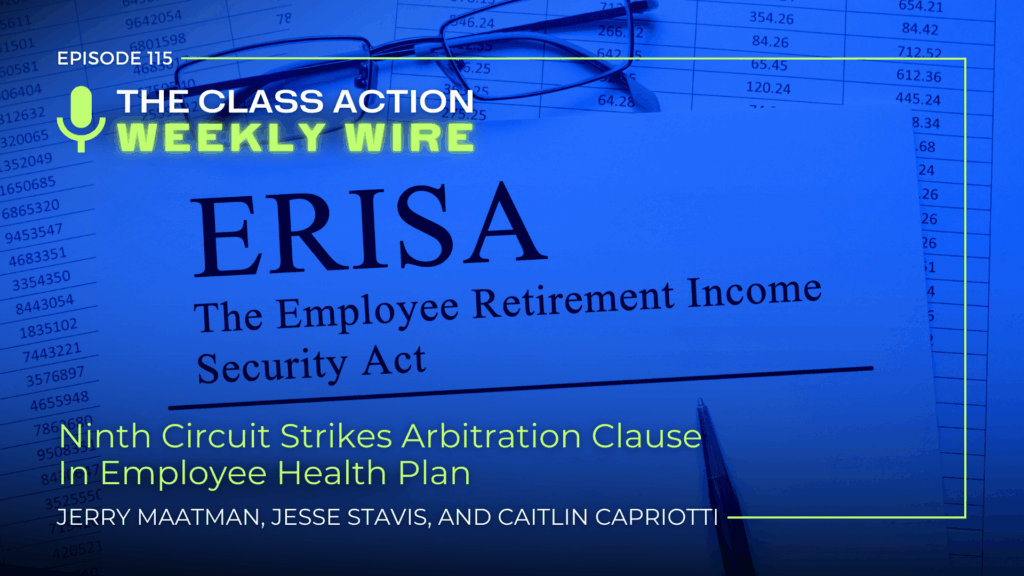By Gerald L. Maatman, Jr., Eden Anderson, Rebecca Bjork, Olga Romadin
Duane Morris Takeaways: On January 28, 2026, in Avery, et al. v. TEKsystems, Inc., 2026 U.S. App. LEXIS 2091, Case No. 24-5810 (9th Cir. Jan 27, 2026), the Ninth Circuit issued an order affirming a district court’s denial of an employer’s motion to compel arbitration. TEK, an IT staffing company, appealed a decision by the district court that declined to enforce arbitration under an agreement it had rolled out after a class certification ruling by a group of recruiters alleging unpaid overtime. The Ninth Circuit found that TEK had issued misleading communications with the arbitration agreement, and had inverted the class opt-out proceedings by requiring putative class members to opt out of the agreement to remain in the litigation. The decision highlights the impact that the choice of language employers utilize in communicating about arbitration agreements has on future litigation and underscores the authority of district courts in procedural considerations when an entire arbitration agreement is challenged.
Case Background
Four plaintiffs brought a putative class action in 2022, alleging that the defendant, a staffing agency specializing in placing IT professionals on temporary assignments, had violated California wage and hour laws by misclassifying recruiters as exempt from overtime and failing to provide meal and rest breaks. Id. at 6. Following nearly two years of litigation and a ruling by the District Court for the Northern District of California granting class certification, TEK implemented a new mandatory arbitration agreement that was automatically applicable to putative members of the class action via a series of emails sent around the holiday season. Id. at 6-8. The emails contained language referring to “exorbitant fees” of class action litigation and disparaged them as “wasteful” and “inefficient.” Id. at 3. The new arbitration agreement precluded class members from participating in the class automatically and required individuals wishing to remain in the class to either resign their positions or to affirmatively opt out of the arbitration agreement. Id. at 12. TEK then moved to compel arbitration.
The District Court denied the motion. It found that the new arbitration agreement was implemented in a manner that was misleading and that the “unilateral” communication of the new arbitration agreement “threatened the fairness of litigation“ and subverted Rule 23’s opt-out procedure by turning it into an opt-in proceeding. Id. at 5.
On appeal, TEK argued that the district court had erred in denying its motion to compel arbitration because it had no authority to invalidate a binding arbitration agreement under Federal Rule of Civil Procedure 23(d). TEK’s argument was rooted in its reading of Rule 23(d) as limiting a district court’s authority to impose conditions on defendants, and also argued that under the Federal Arbitration Act (FAA) a procedural rule could not be used to invalidate an arbitration agreement.
The Ninth Circuit’s Decision
A unanimous panel of the Ninth Circuit affirmed the district court’s decision declining to enforce the motion to compel arbitration.
The Court of Appeals found that under Rule 23(d), the district court had the authority to decline to compel arbitration to ensure fairness, and that the district court had applied the rule correctly. Examining the U.S. Supreme Court’s decision in Gulf Oil Co. v. Bernard, 452 U.S. 89 (1981), the Ninth Circuit found that the district court’s broad authority under Rule 23(d) was applicable to collective actions, that it had a “duty” to exercise its authority to regulate the opt-in process, and thus the district court could refuse to enforce the arbitration agreement in dispute because it had found that TEK had “subverted” the opt-out process by requiring putative members to opt in instead. Id. at 20. The Ninth Circuit determined that Rule 83(b), which permitted a judge to “regulate practice” in the absence of controlling law, and wrote that when read in tandem with Rule 23(d), a district court had the authority to make appropriate decisions with regard to the parties, including in disputes over arbitration. Id. at 24-25.
The Ninth Circuit reviewed the emails that TEK had sent to implement the new arbitration agreement and found that the “disparaging” language used by the company to describe class action litigation was misleading, inaccurate, and confusing, and as a result had had a “harmful” effect on class membership, particularly since it was sent at the end of December 2023 and went into effect in January 2024. Id. at 27-29.
Finally, the Ninth Circuit opined that the arbitration agreement’s delegation provision, which delegated issues of arbitrability to an arbitrator, did not bar a district court from ruling on the enforceability of the arbitration agreement because plaintiffs had challenged the validity of the entire arbitration agreement, including the delegation clause, and under the Supreme Court’s ruling in Coinbase, Inc. v. Suski, 602 U.S. 143 (2024), the whole contract could be considered by the district court as part of the dispute. Id. at 31.
Implications For Class Action Defendants
When implementing a new arbitration agreement, employers should be mindful of the language and timing of their communications on such agreements so as not to appear to be attempting to influence recipients and running afoul of additional scrutiny in litigation.










